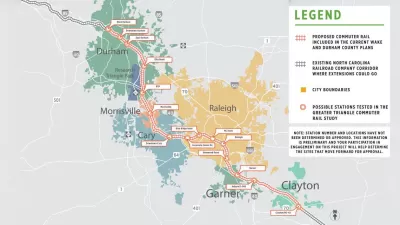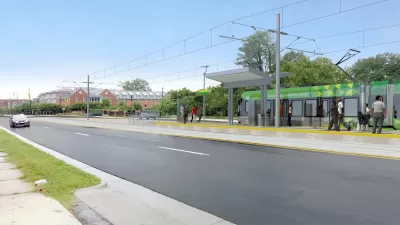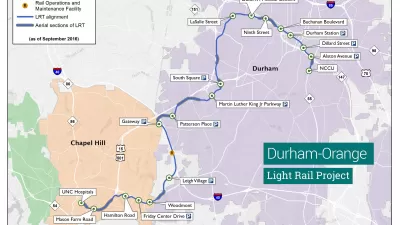A 37-mile commuter rail line under study in North Carolina could connect cities Raleigh, Cary, and Durham in North Carolina, but the system will cost a pretty penny, and it will have to succeed where light rail previously failed.

Richard Stradling reports: "A commuter rail system running 40 trains each weekday between Garner and Durham would cost $1.4 billion to $1.8 billion to build and carry 7,500 to 10,000 passengers a day, according to preliminary estimates from the regional transit agency GoTriangle."
According to the feasibility study released by GoTriangle last week, the 37-mile route studied by GoTriangle would require 34 miles of new tracks to connect Raleigh, Cary, and Durham. Another three miles would use an existing corridor currently owned by the N.C. Railroad.
"The feasibility study from GoTriangle provides the most refined details to date about the commuter rail system proposed by transit plans in both Durham and Wake counties," according to Stradling.
Casting a shadow over the potential of the project to win the financial and political support necessary to succeed is the recent—March 2019—demise of the Durham-Orange Light Rail project.
FULL STORY: Commuter rail in Wake and Durham counties would cost up to $1.8 billion, study says

Alabama: Trump Terminates Settlements for Black Communities Harmed By Raw Sewage
Trump deemed the landmark civil rights agreement “illegal DEI and environmental justice policy.”

Planetizen Federal Action Tracker
A weekly monitor of how Trump’s orders and actions are impacting planners and planning in America.

How Atlanta Built 7,000 Housing Units in 3 Years
The city’s comprehensive, neighborhood-focused housing strategy focuses on identifying properties and land that can be repurposed for housing and encouraging development in underserved neighborhoods.

In Both Crashes and Crime, Public Transportation is Far Safer than Driving
Contrary to popular assumptions, public transportation has far lower crash and crime rates than automobile travel. For safer communities, improve and encourage transit travel.

Report: Zoning Reforms Should Complement Nashville’s Ambitious Transit Plan
Without reform, restrictive zoning codes will limit the impact of the city’s planned transit expansion and could exclude some of the residents who depend on transit the most.

Judge Orders Release of Frozen IRA, IIJA Funding
The decision is a victory for environmental groups who charged that freezing funds for critical infrastructure and disaster response programs caused “real and irreparable harm” to communities.
Urban Design for Planners 1: Software Tools
This six-course series explores essential urban design concepts using open source software and equips planners with the tools they need to participate fully in the urban design process.
Planning for Universal Design
Learn the tools for implementing Universal Design in planning regulations.
Jessamine County Fiscal Court
Caltrans
Institute for Housing and Urban Development Studies (IHS)
City of Grandview
Harvard GSD Executive Education
Toledo-Lucas County Plan Commissions
Salt Lake City
NYU Wagner Graduate School of Public Service





























